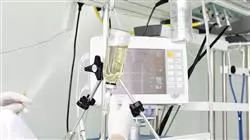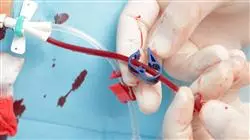University certificate
The world's largest faculty of medicine”
Introduction to the Program
The new scenarios in intensive care medicine push us to propose new specialization programs that meet the real needs of experienced professionals, so that they can incorporate advances in clinical practice in digestive pathology in the critically ill patient"

Digestive pathology is closely related to the body's nutritional function, so proper nutrition in hospitalized patients reduces morbidity and mortality, which makes the prescription of proper nutrition one of the factors considered in the overall treatment of the patient. Nutritional therapy plays a key role in the medical practice performed in intensive care units, and has become a routine part of critical patient care. Likewise, it is directly related to the adequate management of glycemic values and, therefore, it is also associated with the prognosis of critically ill patients, especially in cases where parenteral nutrition is used, reducing the number of complications resulting from poor glycemic control.
This Postgraduate diploma in Current Management of Digestive Pathology in Critically lll Patients is oriented to update the knowledge of the specialist physician in digestive pathology in the critically ill patient and their nutrition. The student will be able to incorporate the advances in the management procedures of the most frequent and relevant digestive pathologies, such as pancreatitis or digestive hemorrhage, that we can find in patients in intensive care units, so that the physician can maintain quality in his daily clinical practice.
Scientific evidence increases the quality of medical care. Staying current is key to providing better care for critically ill patients with digestive pathology"
The Postgraduate diploma in Current Management of Digestive Pathology in Critically lll Patients contains the most complete and updated scientific program on the market. The most important features of the program include:
- Contains Clinical cases presented by experts. The graphic, schematic, and eminently practical contents with which they are created provide scientific and practical information on the disciplines that are essential for professional practice
- Diagnostic and therapeutic novelties on the care of patients with digestive problems
- Presentation of practical workshops on procedures, diagnostic and therapeutic techniques for infectious diseases and guidelines for transplant procedures
- Video lessons on different pathologies and how to approach them
- Algorithm-based interactive learning system for decision-making in the presented clinical situations
- Theoretical lessons, questions to the expert, debate forums on controversial topics, and individual reflection assignments
- Content that is accessible from any fixed or portable device with an Internet connection
This Postgraduate diploma may be the best investment you can make in the selection of a refresher program for two reasons: in addition to updating your knowledge in the care of patients with digestive pathology in the intensive care unit, you will obtain a Postgraduate diploma from TECH Global University"
Its teaching staff includes leading intensive care physicians, who bring the experience of their work to this specialization, in addition to other specialists belonging to prestigious scientific societies.
The multimedia content developed with the latest educational technology will provide the professional with situated and contextual learning, i.e., a simulated environment that will provide immersive training program to train in real situations.
This program is designed around Problem Based Learning, whereby the physician must try to solve the different professional practice situations that arise during the course. For this reason, you will be assisted by an innovative, interactive video system created by renowned and experienced experts in Intensive Care Medicine and with extensive teaching experience.
Increase your decision-making confidence by updating your knowledge with this Postgraduate diploma"

Don't miss the opportunity to update your knowledge in the care of patients with digestive pathology in the intensive care unit to increase the quality of daily medical care"
Why study at TECH?
TECH is the world’s largest online university. With an impressive catalog of more than 14,000 university programs available in 11 languages, it is positioned as a leader in employability, with a 99% job placement rate. In addition, it relies on an enormous faculty of more than 6,000 professors of the highest international renown.

Study at the world's largest online university and guarantee your professional success. The future starts at TECH”
The world’s best online university according to FORBES
The prestigious Forbes magazine, specialized in business and finance, has highlighted TECH as “the world's best online university” This is what they have recently stated in an article in their digital edition in which they echo the success story of this institution, “thanks to the academic offer it provides, the selection of its teaching staff, and an innovative learning method aimed at educating the professionals of the future”
A revolutionary study method, a cutting-edge faculty and a practical focus: the key to TECH's success.
The most complete study plans on the university scene
TECH offers the most complete study plans on the university scene, with syllabuses that cover fundamental concepts and, at the same time, the main scientific advances in their specific scientific areas. In addition, these programs are continuously being updated to guarantee students the academic vanguard and the most in-demand professional skills. In this way, the university's qualifications provide its graduates with a significant advantage to propel their careers to success.
TECH offers the most comprehensive and intensive study plans on the current university scene.
A world-class teaching staff
TECH's teaching staff is made up of more than 6,000 professors with the highest international recognition. Professors, researchers and top executives of multinational companies, including Isaiah Covington, performance coach of the Boston Celtics; Magda Romanska, principal investigator at Harvard MetaLAB; Ignacio Wistumba, chairman of the department of translational molecular pathology at MD Anderson Cancer Center; and D.W. Pine, creative director of TIME magazine, among others.
Internationally renowned experts, specialized in different branches of Health, Technology, Communication and Business, form part of the TECH faculty.
A unique learning method
TECH is the first university to use Relearning in all its programs. It is the best online learning methodology, accredited with international teaching quality certifications, provided by prestigious educational agencies. In addition, this disruptive educational model is complemented with the “Case Method”, thereby setting up a unique online teaching strategy. Innovative teaching resources are also implemented, including detailed videos, infographics and interactive summaries.
TECH combines Relearning and the Case Method in all its university programs to guarantee excellent theoretical and practical learning, studying whenever and wherever you want.
The world's largest online university
TECH is the world’s largest online university. We are the largest educational institution, with the best and widest online educational catalog, one hundred percent online and covering the vast majority of areas of knowledge. We offer a large selection of our own degrees and accredited online undergraduate and postgraduate degrees. In total, more than 14,000 university degrees, in eleven different languages, make us the largest educational largest in the world.
TECH has the world's most extensive catalog of academic and official programs, available in more than 11 languages.
Google Premier Partner
The American technology giant has awarded TECH the Google Google Premier Partner badge. This award, which is only available to 3% of the world's companies, highlights the efficient, flexible and tailored experience that this university provides to students. The recognition as a Google Premier Partner not only accredits the maximum rigor, performance and investment in TECH's digital infrastructures, but also places this university as one of the world's leading technology companies.
Google has positioned TECH in the top 3% of the world's most important technology companies by awarding it its Google Premier Partner badge.
The official online university of the NBA
TECH is the official online university of the NBA. Thanks to our agreement with the biggest league in basketball, we offer our students exclusive university programs, as well as a wide variety of educational resources focused on the business of the league and other areas of the sports industry. Each program is made up of a uniquely designed syllabus and features exceptional guest hosts: professionals with a distinguished sports background who will offer their expertise on the most relevant topics.
TECH has been selected by the NBA, the world's top basketball league, as its official online university.
The top-rated university by its students
Students have positioned TECH as the world's top-rated university on the main review websites, with a highest rating of 4.9 out of 5, obtained from more than 1,000 reviews. These results consolidate TECH as the benchmark university institution at an international level, reflecting the excellence and positive impact of its educational model.” reflecting the excellence and positive impact of its educational model.”
TECH is the world’s top-rated university by its students.
Leaders in employability
TECH has managed to become the leading university in employability. 99% of its students obtain jobs in the academic field they have studied, within one year of completing any of the university's programs. A similar number achieve immediate career enhancement. All this thanks to a study methodology that bases its effectiveness on the acquisition of practical skills, which are absolutely necessary for professional development.
99% of TECH graduates find a job within a year of completing their studies.
Postgraduate Diploma in Postgraduate Diploma in Current Management of Digestive Pathology in Critically Ill Patients
Current management in digestive pathology in the critically ill patient focuses on preventing, diagnosing and treating gastrointestinal complications that can occur in critically ill patients who are hospitalized in intensive care units (ICU).
Critically ill ICU patients are at increased risk of developing digestive pathologies such as stress ulcers, gastrointestinal bleeding, pancreatitis, infectious diarrhea, ileus and intestinal obstruction due to their critical health status, the presence of underlying diseases and the necessary medical therapy.
Current management in digestive pathology in the critically ill patient includes preventive measures such as optimizing nutritional support, reducing stress and improving pain control. It also includes diagnostic and treatment measures such as endoscopy, pharmacologic therapy to reduce gastric acidity and protect the gastrointestinal mucosa, use of antibiotics to treat infectious diarrhea, and surgical management for intestinal obstruction or gastric perforation.
In addition, current management in digestive pathology in the critically ill patient also includes regular monitoring for signs of gastrointestinal complications and performing early interventions to prevent progression to serious complications.
Current management of digestive pathology in the critically ill patient focuses on preventing, diagnosing and treating gastrointestinal complications that can occur in critically ill ICU patients through preventive, diagnostic and treatment measures, as well as regular monitoring and early interventions.
The university expert in current management of digestive pathology in the critically ill patient will be prepared to diagnose and treat digestive diseases in critically ill patients, as well as to work in multidisciplinary teams in the management of critically ill patients with digestive pathologies. They will also be qualified to prescribe the appropriate medication and to apply the most appropriate nutritional and pharmacological treatments to treat the different digestive pathologies in critically ill patients.







